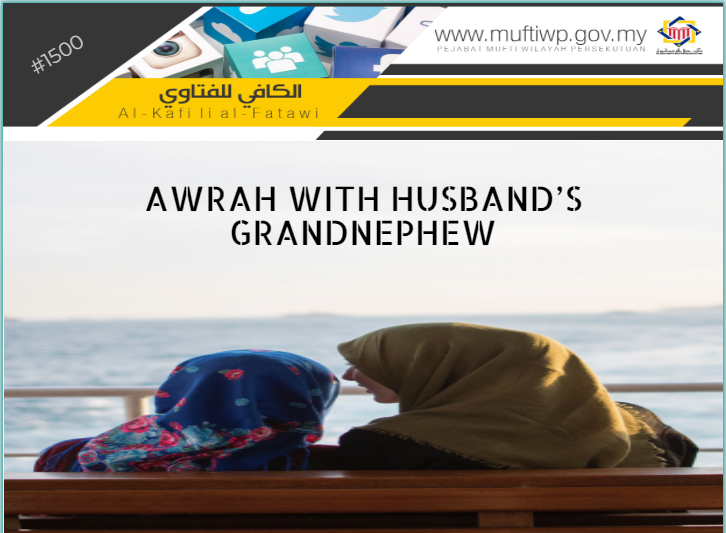Question:
Assalamualaikum w.b.t. Dato’, I want to ask about awrah. Here, I am married to a man who was a widower and he raised his grandnephew since he was a baby. So, how is my awrah with this child? This child is now aged 19. Can I shake hands with him? Is it permissible for me to unveil when I am at home?
Answer:
Waalaikumussalam w.b.t,
Alhamdulillah, praise and thanks to Allah for the countless blessings He has blessed us all with. Blessings and salutations to the Prophet Muhammad PBUH, his wives, his family, companions and all those that follow his teachings to the day of judgement.
Lexically, there are several definitions of mahram. We summarized some of them as follows:
- Individuals who are prohibited for one to get married to either due to rahim or qarabah relationship.
- Something prohibited by Allah SWT
Meanwhile, according to Fiqh perspective, mahram means: “Individuals we are prohibited to marry and the prohibition is in the form of al-ta’bid (eternal) due to mubah reasons, not due to their honor and not due to removable prohibition”. Refer Kaasyifah al-Saja, Nawawi bin ‘Umar (Hlm. 114).
In explaining the meanings of the definitions above, we detail it as follows:
The phrase ‘in the form of al-ta’bid’ means: It does not include the wife’s female siblings. The same for wife’s paternal and maternal aunts. This is because the prohibition is only when they are gathered (means be married to at the same time between the wife and the stated women).
While the phrase ‘not due to their honor’ means the wives of the Prophet PBUH. This is because the prohibition is due to their honor. Hence, it is prohibited upon all ummah as well as other prophets.
And the phrase ‘not due to removable prohibition’ is like the Majus women or the apostates. This is because the prohibition is due to reasons which are removable. Hence, they may be halal at other times (like when they embrace Islam).
The description on the mahram is stated in the saying of Allah SWT:
حُرِّمَتْ عَلَيْكُمْ أُمَّهَاتُكُمْ وَبَنَاتُكُمْ وَأَخَوَاتُكُمْ وَعَمَّاتُكُمْ وَخَالَاتُكُمْ وَبَنَاتُ الْأَخِ وَبَنَاتُ الْأُخْتِ وَأُمَّهَاتُكُمُ اللَّاتِي أَرْضَعْنَكُمْ وَأَخَوَاتُكُم مِّنَ الرَّضَاعَةِ وَأُمَّهَاتُ نِسَائِكُمْ وَرَبَائِبُكُمُ اللَّاتِي فِي حُجُورِكُم مِّن نِّسَائِكُمُ اللَّاتِي دَخَلْتُم بِهِنَّ فَإِن لَّمْ تَكُونُوا دَخَلْتُم بِهِنَّ فَلَا جُنَاحَ عَلَيْكُمْ وَحَلَائِلُ أَبْنَائِكُمُ الَّذِينَ مِنْ أَصْلَابِكُمْ وَأَن تَجْمَعُوا بَيْنَ الْأُخْتَيْنِ إِلَّا مَا قَدْ سَلَفَ ۗ إِنَّ اللَّـهَ كَانَ غَفُورًا رَّحِيمًا
Prohibited to you [for marriage] are your mothers, your daughters, your sisters, your father's sisters, your mother's sisters, your brother's daughters, your sister's daughters, your [milk] mothers who nursed you, your sisters through nursing, your wives' mothers, and your step-daughters under your guardianship [born] of your wives unto whom you have gone in. But if you have not gone in unto them, there is no sin upon you. And [also prohibited are] the wives of your sons who are from your [own] loins, and that you take [in marriage] two sisters simultaneously, except for what has already occurred. Indeed, Allah is ever Forgiving and Merciful.
Surah al-Nisaa’ (23)
Imam al-Mawardi Rahimahullah cited words of Imam al-Syafi’e:
أَصْلُ مَا يَحْرُمُ بِهِ النِّسَاءُ ضَرْبَانِ أَحَدُهُمَا بأنسابٍ، وَالْآخَرُ بأسبابٍ مِنْ حَادِثِ نكاحٍ أَوْ رضاعٍ
The original rules which make a woman becomes mahram are divided into two. First is the ansab (lineage) and the second one is asbab (reasons), which comes from marriage or nursing. Refer Al-Hawi Al-Kabir, Al-Mawardi (9/196).
Then, Imam al-Mawardi detail it further when he says: Mahram women are divided in two categories. Firstly: Those who are prohibited eternally. While the other one is prohibited when gathered (in one marriage). And those who are prohibited eternally are divided into two which are through nasab and asbab (marriage and nursing). Refer Al-Hawi Al-Kabir, Al-Mawardi (9/196).
The implication of prohibition under the category of nasab and asbab (marriage and nursing) are as follows:
- It is prohibited (haram) to get married to her.
- It is permissible to shake hands with her.
- It is permissible to be alone together (khalwah) with her.
Hence, referring back to the above question that the wife of great-uncle is not included in mahram according to the excerpt of Surah al-Nisaa’ verse 23. Among those included in the category of non-mahram are the wife of paternal uncle (العم), the wife of maternal uncle (الخال) and the wife of male siblings. And the concept applied here according to the jurists (fuqaha’) is the wives of the uncles and above. So, the wife of great-uncle is also included in this, hence, they are ajnabi women towards a man.
Conclusion
As a conclusion, we state that the wife of great-uncle is an ajnabi woman to a man in the issue of mahram. Hence, a woman is obligated to cover her awrah in term of all parts of her body except face and palm as well as maintaining the relationship of ajnabi and it is prohibited for them to shake hands with each other. This is because, generally, women who are not mentioned as muharramat (mahram women) in Surah al-Nisaa’ verse 23 are categorized as ajnabi women.
Lastly, we pray that Allah SWT bless us with the correct understanding in religion. Ameen.


